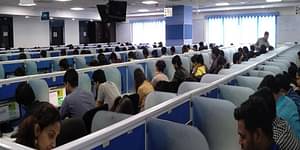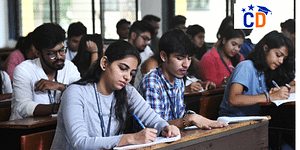BSc Food Technology
BSc in Food Technology Overview
BSc in Food Technology is a three-year full-time undergraduate programme that takes into account the examination of the processes and technologies involved in the production, preparation, and preservation of food that is entirely safe for people to eat. Through this programme, candidates are capable of understanding essential concepts like nutrition, dietary composition, and physical and microbiological depictions. The BSc in Food Technology syllabus and subjects include topics such as microbiological, nutritional, chemical, and biological research. It also helps students grasp different methods of food preparation and preservation. After obtaining at least 50% aggregate marks in a science-related 12th grade, prospective candidates are eligible to enrol in this programme.
Popular entry tests for this course include the CFTRI Aptitude Test, IIFPT, SET, and IMU CET. Students are chosen for admission to the BSc in Food Technology course either directly based on their 12th-grade test results or via university entrance tests, which are followed by a round of personal interviews, if any. Furthermore, depending on whether the institute is government or private, the average course fee varies from INR 50,000 to INR 2,00,000 per year. In India, Dr Punjabrao Vidyapeeth, ITM University, Adikavi Nannaya University, Hindustan University, Baba Farid College, and other prestigious universities are among the top choices for BSc in Food Technology students. Graduates of this programme may expect to make an average starting salary of INR 3.8 LPA in roles like purchasing manager, nutrition consultant, research scientist, quality manager, and more.
Table of Contents
- BSc in Food Technology Overview
- BSc in Food Technology Highlights
- Why Choose a BSc in Food Technology Degree?
- What is an Online BSc in Food Technology Degree?
- Difference Between BSc in Food Technology and BSc in Agriculture Degrees
- Types BSc in Food Technology Programs
- BSc Food Technology Eligibility Criteria
- BSc in Food Technology Entrance Exams
- How to Get Admission to BSc Food Technology?
- What is BSc Food Technology Course Fees?
- BSc Food Technology Syllabus & Subjects
- Top Private BSc in Food Technology Colleges in India
- Top Government BSc in Food Technology Colleges in India
- BSc Food Technology Scope in India
- What is the BSc Food Technology Salary?
- Skills That Make You the Best BSc Food Technology Graduate
- BSc Food Technology Career Options and Job Prospects
- Courses After BSc in Food Technology Degree
- FAQs about BSc Food Technology
BSc in Food Technology Highlights
The major highlights of the BSc in Food Technology course are mentioned in the infographic below and explained further in the table.
| Particular | Detail |
|---|---|
| Name | BSc in Food Technology Course |
| Course Name | Bachelor of Science in Food Technology |
| Level of Programme | Bachelor |
| Duration | 3 years |
| Exam Type | Semester-wise |
| Eligibility Criteria | 10+2 with at least 50% aggregate marks in Science-related subjects |
| Admission Process | Merit-Based + Entrance Exam |
| Top Entrance Exams | IMU CET, SET, IIFPT, CFTRI Aptitude Test, and more. |
| Average Course Fees | INR 50,000 p.a. to INR 2 LPA |
| Average Annual Salary | INR 3.8 LPA |
| Job Profiles | Bacteriologist, Food Technologist, Toxicologist, Dairy Technologist, Farm manager, Agricultural Inspector, Organic Chemist, Biochemist, Home Economist, Research Scientist, Head Engineer, Production Manager, Recruiter, etc. |
| Top Recruiters | Nestle India Private Limited, Dabur India Limited, PepsiCo India, MTR Foods Limited, Agro Tech Foods, Perfetti India, Amul, Godrej India Limited, Hindustan Unilever Limited, Cadbury India Limited, etc. |
| Top Employment Area | Marketing or Quality Assurance Firms, Production Management Companies, Logistics Departments, Research and Development Centers, Hotels and Restaurants, etc. |
Why Choose a BSc in Food Technology Degree?
There are numerous advantages to earning a BSc in Food Technology degree. Candidates who take this course will have an easier time grasping fundamental ideas including food composition, nutrition, and the physical, chemical, and microbiological characteristics of food. Additionally, it gives them a thorough understanding of the technical and scientific methods needed to comprehend the nature of unprocessed dietary ingredients. It is, after all, a chance to become fully informed about the food technology that controls our everyday existence. Here are a few examples for choosing a career as a Food Technologist or pursuing a BSc in Food Technology course as listed in the infographic below and explained further.
- Graduates in food technology can easily obtain entry-level jobs in production management companies, marketing or quality assurance departments, logistics divisions, R&D centres, colleges and universities, hotels and restaurants, and other similar settings.
- Candidates enrolled in BSc in Food Technology courses can pursue careers in government and commercial industry as organic chemists, food technologists, production managers, and other roles.
- An MSc in Food Technology is a great option for those who want to continue their study in the industry and can help them progress in their professions in both the public and private sectors, leading to promotions.
What is an Online BSc in Food Technology Degree?
One of the easiest methods to learn without taking time away from other responsibilities is through the distance learning BSc in Food Technology course. It is a preferred degree programme that allows individuals to complete their education and keep working. The course curriculum is just as promising as that of a regular BSc programme in food technology. This course is offered by universities like SCDL, BRAOU, and IGNOU.
Applicants will gain knowledge in food microbiology, nutrition and dietetics, and the foundations of food chemistry through this programme. These graduates can find employment as nutritionists, food research scientists, and quality control officers, among many other positions. DEB has validated all of the institutions that are providing this course. There is no entrance exam required for admission, and the course fee ranges from INR 10,000 to 45,00,000 annually.
Difference Between BSc in Food Technology and BSc in Agriculture Degrees
As part of a BSc in Food Technology degree, students learn methods and practices for transforming raw materials into finished/edible products. On the other hand, the study of agricultural science, which includes fields like plant pathology, agricultural microbiology, soil science, and genetics and plant breeding, is the focus of the BSc Agriculture course. The comparison between a BSc in Food Technology and a BSc in Agriculture is distinguished based on duration, fees, course content, and other factors in the table below:
| Parameters | BSc Food Technology | BSc Agriculture |
|---|---|---|
| Full-Form | Bachelor of Science in Food Technology | Bachelor of Science in Agriculture |
| Course Overview | The application of food science to the selection, preservation, processing, packaging, distribution, and use of safe food by everybody is the focus of this course. | BSc Agriculture course is a blend of theoretical and practical applications for a variety of tasks such as crop production, food processing, soil analysis, and so on. |
| Course Duration | 3 years | 3 years |
| Entrance Exams | IMU CET, SET, IIFPT, CFTRI Aptitude Test, and so on. | CG PAT, AGRICET, UPCATET, CUET, MHT CET, and more. |
| Eligibility | Passed 10+2 with at least 50% aggregate in Physics, Chemistry, Biology and Mathematics as compulsory subjects | Passed 10+2 with a minimum of 55% aggregate in Physics, Biology, Chemistry, and Mathematics as mandatory subjects |
| Average Fees | INR 50,000 to INR 2 LPA | INR 3,600 to INR 9.6 LPA |
| Colleges | Andhra Loyola College, Hyderabad, DAV College, Jalandhar, Bhaskar Acharya College of Applied Sciences, New Delhi, etc. | Banaras Hindu University, SGT University, Gurgaon, Lovely Professional University, etc. |
Types BSc in Food Technology Programs
BSc in Food Technology courses are in high demand in India. Students can select from a variety of courses based on their interests and preferences such as full-time and online/distance learning. However, a part-time course is not provided for this programme by almost any university. Discussed below are a few BSc Food Technology course types:
Full-Time BSc in Food Technology Courses
In this type of course, students must attend full-time in-person classes, complete regular assignments, and take semester-wise offline exams on campus. They must also propose projects and perform practicals as part of the diverse course curriculum. With this, candidates gain practical experience in the subject as well as in-depth learning through actively engaging with their instructors and other fellow students.
Distance/Online Learning BSc in Food Technology Courses
Distance/online BSc Food Technology education is the most rewarding three-year UG degree programme. It takes six semesters to complete the programme. The fact that it is less expensive than ordinary courses is the most remarkable feature of this course. Second, it allows you to study in any area that is convenient for you. The third advantage is that it gives you more scheduling flexibility. Further, BSc in Food Technology distance/online course admissions are completely based on merit and do not require one to sit for an entrance exam. In India, institutions such as NIFTEM, IGNOU, and others provide this course through distance learning.
BSc Food Technology Eligibility Criteria
The candidates who wish to pursue a degree in this field must fulfil certain BSc Food Technology eligibility criteria. Though these criteria vary from one university to another, certain requirements are common with all. The eligibility criteria required for admission to BSc Food Technology are listed below:
- Candidates must have passed 12th grade or an equivalent degree from a recognised institute/board in India.
- Students must have opted for Mathematics, Chemistry/ Biology/ Biotechnology, and Physics as the major subjects in class 12th.
- The prospective applicant must have received a minimum aggregate of 50% marks (45% for the reserved candidates) in 12th grade.
- Applicants who are appearing for the final exam or waiting for their final result from class 12 can also apply for admission.
BSc in Food Technology Entrance Exams
The majority of institutions and colleges admit students to their BSc in Food Technology course either by a written entrance exam or by their class 10+2 aggregate marks. On the other hand, several universities also offer applicants direct admission based just on their performance on the most recent qualifying exam. The following is a list of different BSc Food Technology entrance exams which students may consider taking:
CUET UG: The NTA administers the Common University Entrance Test, or CUET UG, a national-level entrance exam for admission to UG courses provided by participating institutions. Depending on the volume of applicants registered for the entrance exam, it is administered in different phases using a computer.
SET Exam: Symbiosis International (Deemed University) administers the Symbiosis Entrance Test, or SET exam, to applicants for admission to Symbiosis institutes. Admission to undergraduate programmes in engineering, law, management, economics, computer studies, mass communication, and liberal arts is facilitated by this assessment.
NPAT Exam: Conducted by the Narsee Monjee Institute of Management Studies (NMIMS),the NPAT exam is administrated as a computer-based test from an exam centre. Sections such as Academic Proficiency, Reasoning and General Intelligence, English Language Proficiency, and Quantitative and Numerical Ability are typically covered in the exam.
CUCET Exam: The CUCET exam, an online entrance test, is conducted by Chandigarh University, that takes place twice a year in two phases — Phase I and Phase II. The university offers several undergraduate programmes, including the BSc in Food Technology course, for which candidates must pass this national test.
How to Get Admission to BSc Food Technology?
For the BSc Food Technology degree programme, each university has its unique admissions procedure that is either entrance-based or merit-based. Most institutions provide merit-based admission, which is an easy procedure. Students can find the admissions procedure for the BSc in Food Technology listed below:
- The majority of institutions and colleges that offer the BSc Food Technology programme admit students based on how well they perform in the entrance exam held by the admission authorities, which is followed by additional rounds of admission.
- However, some colleges and universities grant admission to this programme based on how well the applicant performed on their class 12 examination.
- Students must achieve high scores in both the entrance exam and the 12th-grade exam to be directly admitted to the BSc in Food Technology programme.
- Based on the results of the admission exam and class 12 grades, colleges and universities will produce a merit list.
- For document verification, those who have been selected will be contacted.
- Prospective students will be given admission to the programme upon the successful completion of the document verification process.
What is BSc Food Technology Course Fees?
The BSc Food Technology course fee depends on different factors such as the type of the institute, the popularity/ ranking of the university, the merit/ scholarship achieved by the candidate, etc. For instance, the candidate retaining higher marks in the entrance exams will be provided with a higher scholarship, accounting for an overall lower course fee as compared to students willing to take direct admission. On the other hand, government-based institutes will have much lower fees as compared to private institutes. The table below highlights the list of a few BSc in Food Technology colleges along with their course fee structure.
College Name | Average Fee (in INR) |
|---|---|
Adikavi Nannaya University, Rajahmundry | 35,000 |
Andhra College, Vijayawada | 21,000 |
Andhra Loyola College, Vijayawada | 40,000 |
Baba Farid College, Bathinda | 53,000 |
Dr Harivansh Mahavidyalaya, Unnao | 12,500 |
BSc Food Technology Syllabus & Subjects
The B Tech Food Technology subjects and syllabus teach and engage students about the science of food. The course allows students to learn about food production, processing, preservation, labelling, packaging, and more. Basic introductions to food technology and its principles, electives, core subjects, lab exercises, and projects make up the course's five major divisions. Given below are a few BSc Food Technology syllabi & subjects:
- Food Engineering
- Food Microbiology
- Food Quality and Sensory Evaluation
- Foundation of Food and Nutrition
- Fundamentals of Food Technology
- Principles of Food Science
- The Technology of Dairy and Seafood
- The Technology of Food Preservation
- The Technology of Meat, Eggs, and Poultry
Top Private BSc in Food Technology Colleges in India
Numerous excellent institutes in India provide high-quality BSc in Food Technology courses and study opportunities. Course fees and job placement probabilities are two key factors to consider while selecting a college for this degree.
Deemed to be Universities and other independent engineering institutes are among the private colleges. These universities are well-liked for offering food technology programmes because they have top-notch facilities and knowledgeable faculty. The following table highlights the top private BSc in Food Technology colleges in India:
| College Name | Total Course Fee (Approx. in INR) |
|---|---|
| Vignan's Foundation for Science, Technology and Research | 2,00,000 to 7,00,000 |
| UPES Dehradun | 10,00,000 |
| Shoolini University | 4,00,000 to 9,00,000 |
| Sharda University | 2,00,000 to 8,00,000 |
| Lovely Professional University (LPU) | 3,00,000 to 10,00,000 |
| KEC Engineering College | 50,000 to 2,00,000 |
| Karunya Institute of Technology and Science | 2,00,000 to 9,00,000 |
| Kalasalingam Academy of Research and Education | 4,00,000 |
| Chandigarh University | 6,00,000 to 8,00,000 |
| Amity University, Noida | 3,00,000 to 18,00,000 |
Note: The BSc Food Technology fees mentioned in the table above are sourced from the official websites of the respective institutions, which may vary from one year to another.
Top Government BSc in Food Technology Colleges in India
In all, 274 of India's best private and government engineering schools provide courses in this field. Several IITs and other federal and state institutions that provide UG, PG, and PhD programmes are among the best government institutes for studying food technology. The following table highlights the top government BSc in Food Technology colleges in India:
| College Name | Total Course Fee (Approx. in INR) |
|---|---|
| Tezpur University | 90,000 to 2,00,000 |
| Panjab University | 5,00,000 |
| NIFTEM Sonepat | 2,00,000 to 6,00,000 |
| National Institute of Technology, Rourkela | 2,00,000 to 5,00,000 |
| Jadavpur University | 5,000 to 21,000 |
| Institute of Chemical Technology | 1,00,000 to 3,00,000 |
| Indian Institute of Technology Kharagpur | 20,000 to 10,00,000 |
| Indian Institute of Food Processing Technology, Thanjavur | 2,00,000 to 3,00,000 |
| Guru Nanak Dev University | 1,00,000 to 5,00,000 |
| Annamalai University | 50,000 |
Note: The BSc Food Technology fees mentioned in the table above are sourced from the official websites of the respective institutions, which may vary from one year to another.
BSc Food Technology Scope in India
BSc Food Technology course is not a new field, but it has advanced at a breakneck pace in the previous decade. To strengthen their product range, top corporations are in desperate need of skilled food technologists. Here are a few reasons why a job in food technology might be rewarding:
Healthy Lifestyles are Increasingly Popular: People are becoming increasingly concerned about their health and lifestyle. Companies must create items that are not just profitable but also beneficial to customers. Because of this, food technologists have a bright future working in this business.
High-Paying Jobs: Aspirants with a PhD in food technology who work in research and development earn a fantastic wage.
In addition, candidates with a BSc in Food Technology degree can pursue a variety of careers. Students with a BSc Food Technology degree can pursue careers as food technologists, organic chemists, technical brewers, production managers, and so on. This BSc Food Technology scope is rapidly expanding and will continue to do so in the future. Postgraduates with a BSc Food Technology course can work in a variety of settings, both in the private and public sectors.
What is the BSc Food Technology Salary?
BSc Food Technology salary varies depending on experience, study subjects, and other criteria. Graduates are sometimes portrayed as having a little difficulty getting work in educational institutions or other sectors. On average, a BSc in Food Technology salary ranges between INR 4 and INR 8 LPA. Years of experience, as well as the quality of one's job, can all contribute to increased earnings.
Further, the salary packages for various job profiles, as well as recruiters, differ. One can work for a range of companies in a variety of positions after earning a BSc in Food Technology course. Some of the job characteristics and BSc Food Technology salary earned are as follows:
Designation | Average Salary (in INR) |
|---|---|
| Food Technologist | 3.8 LPA |
| Food Safety Officer | 3.7 LPA |
| Quality Assurance Executive | 5.5 LPA |
| Laboratory Assistant | 3 LPA |
Skills That Make You the Best BSc Food Technology Graduate
Students interested in pursuing a career in the field of food technology should place problem-solving at the core of their technological competencies. Listed below are some skills that may make you the best BSc Food Technology graduate:
- Food science piques your interest
- Interest in diet and health
- Technical/practical/organisational/problem-solving abilities
- Skills in research and observation
- Taking a scientific approach
- Organise your time
- Consumer market awareness
- Mind that is analytical
- Possess the ability to work with a wide range of details
BSc Food Technology Career Options and Job Prospects
Students can work in the field of food technology as undergraduates or postgraduates. While a bachelor's degree is sufficient for employment as a food technologist, a master's degree provides candidates with the necessary competitive advantage. A master's or doctoral degree is also required for people who desire to pursue a research job.
BSc Food Technology Careers: Hospitals, restaurants, food processing companies, catering establishments, soft drink manufacturing companies, spice, cereal, and rice mills, quality control organisations, food research laboratories, and the packaging industry are all places where graduates or postgraduates in food technology can find work. Students with a postgraduate degree can work in biotechnology and bioinformatics firms, water conservation and research organisations, and the pharmaceutical business, among other locations.
You can pursue a variety of employment opportunities with a BSc in Food Technology. Some of the most common BSc Food Technology jobs and career opportunities are as follows:
Job Profiles | Description |
|---|---|
| Lab Technician | A lab technician's main role is to provide all technical support required to keep the lab running smoothly. A lab technician's responsibilities include sampling, testing, measuring, and interpreting results. |
| Research scientist | Experiments that lead to improvements in yield, flavour, nutrition, and general acceptability of packaged food are part of a research scientist's job description. |
| Organic chemist | An organic chemist is a specialist who advises on how raw materials should be transformed into processed foods. |
| Biochemist | A biochemist's job is quite similar to that of an organic chemist. A biochemist offers ways to improve food quality, flavour, texture, storage, and other factors. |
| Quality controller/ food inspector | A quality controller/food inspector's task is to guarantee that the quality of the food produced is maintained. A food inspector does the same thing, running a range of tests on both the packaging and the food to guarantee that the food that reaches people is safe to eat. |
| Managers and accountants | Supervising the processing work is one of a manager's main tasks. Apart from that, a manager is in charge of food administration and money. |
| Home economist | A nutrition and dietetics expert is a home economist. The major responsibility of the expert is to test the food and recipes according to the directions on the containers. |
| Engineer | Engineers in the food technology industry are responsible for planning, designing, improving, and maintaining processing systems. |
| Food product development director | A food product development director aids in the development of innovative technologies that aid in the preservation and packaging of food products. |
Courses After BSc in Food Technology Degree
Graduates who have a strong interest in food technology may advance their careers by pursuing an MSc or PhD in the subject. These programmes will not only help students obtain higher pay but also provide them with a wealth of practical expertise. Listed below are a few academic programmes students may consider pursuing after a BSc in Food Technology course.
PG Diploma in Food Technology Course: The PGD in Food Technology programme covers food quality management and research, food processing, food preservation, and other technology-related issues that contribute to improved food quality.
MPhil in Food Science and Technology Course: Postgraduate study leading to an MPhil in Food Science and Technology lasts two years. With an understanding of food processing and technology, students may not only stop food deterioration processes by creating newer technologies but also comprehend the mechanisms behind them.
MSc in Food Technology Course: With an MSc in Food Technology, candidates may analyse the genetic code of plants and crops and learn about other sources of the essential nutrients that the human body needs. This is an advanced course with applications in the food manufacturing, packaging, and agricultural industries.
PhD in Food Technology Course: A doctorate programme in food technology and allied subjects, focused on research, is referred to as PhD Food Technology. Vegetable and cereal technology, food quality control, dairy and poultry technology, food chemistry, and other areas of food technology are all covered.
FAQs about BSc Food Technology
What is the average BSc in Food Technology salary in India?
The average BSc in Food Technology salary in India ranges between INR 3 LPA and INR 5 LPA for freshers with 0 to 3 years of experience. Higher salaries and excellent career progression are both achievable with additional education and experience in this sector. In this industry, senior management positions are often given to individuals with extensive experience. After 7 to 8 years, professionals may earn a decent package of between INR 10 LPA and INR 12 LPA.
Which are the best recruiters for BSc in Food Technology?
BSc in Food Technology graduates are hired by numerous public and private firms. The top private companies offer decent starting salaries ranging between INR 6 LPA and INR 9 LPA compared to government bodies offering starting salaries between INR 3.5 LPA and 6.4 LPA. The top recruiters for B.Sc Food Technology are PepsiCo India, Nestle India Private Limited, Dabur India Limited, MTR Foods Limited, Agro Tech Foods, Perfetti India, and more.
What are the top career options after a BSc in Food Technology?
Several top career options after a BSc in Food Technology are available for graduates in both the public and private sectors. Candidates who have completed a BSc Food Technology and internships can either look for entry-level jobs or pursue further education. The top career options after BSc in Food Technology are Bacteriologist, Food Technologist, Toxicologist, Dairy Technologist, Farm manager, Agricultural Inspector, Quality Manager, Nutrition Consultant, Research Scientist, Food Blogger, etc.
What is BSc in Food Technology?
BSc Food in Technology is a three-year full-time undergraduate course in the field of food technology industry. The processes and actions involved in food preservation, processing, and manufacturing are thoroughly examined in this degree programme. Candidates who wish to pursue a career in this field must have completed their 10+2 with at least 50%. After this, they may work as Toxicologists, Food Technologists, Bacteriologists, or Dairy Technologists.
What is the full form of BSc in Food Technology?
The full form of BSc in Food Technology is the Bachelor of Science in Food Technology. It is a three-year full-time undergraduate course that focuses on the academic investigation of food methods, including activities related to food processing, production, and preservation. Food technology, hotel management, engineering, and home science are all fully integrated within the B.Sc Food Technology course curriculum.
What is the BSc in Food Technology eligibility criteria?
The BSc in Food Technology eligibility criteria state that the candidates must have completed Class 12 or equivalent in a relevant discipline from a recognised board with a cumulative grade point average of at least 50% (45% for SC/ ST candidates). Also, they must have taken Physics, Chemistry, Biology, and Home Science in class 12 as required subjects.
Can I do BSc in Food Technology after 12th grade?
Yes, candidates can do BSc in Food Technology after 12th grade. To be eligible for that, candidates must have passed class 12 or equivalent from a recognised board with Physics, Chemistry, and Biology/Home Science as compulsory subjects and an overall grade of at least 50% (45% for SC/ ST/ OBC candidates).
What is the duration of the BSc in Food Technology course?
The duration of the BSc in Food Technology course is three years. It is a full-time undergraduate course that deals with the Science and technology behind food, its production, preservation, and processing. The concepts of food Microbiology, Chemistry, and different commercial quality control practices are taught to students in food technology courses. Aspirants can obtain experience with the various machines and equipment used in the food sector by leveraging the work opportunities in this sector.
What is the admission process for BSc in Food Technology?
The admission process for BSc in Food Technology depends on a student’s 10+2 percentage or the relevant entrance test conducted by a respective college. For this, they must visit the university's official website, fill out the appropriate application, provide supporting documents, and pay the required application fee. In the absence of an online application form, the candidate must visit the college to complete the form in person.
What are the popular entrance exams for BSc in Food Technology?
The popular entrance exams for BSc in Food Technology are the Indian Maritime University Common Entrance Test (IMU CET) and (Symbiosis Entrance Test) SET. However, these exams are not held commonly as most admissions are done based on the student’s performance in 12th grade. As part of the admissions process, colleges may conduct a personal interview and a group discussion session.
What are the top BSc in Food Technology colleges in India?
While there are many popular colleges, the list of the top BSc in Food Technology colleges in India includes Baba Farid College (Bathinda), Adikavi Nannaya University (Rajahmundry), Dr Punjabrao Vidyapeeth (Akola), Hindustan University (Chennai), Parul Institute of Applied Sciences (Vadodara), ITM University (Gwalior), Andhra Loyola College (Vijayawada), Rishihood University (Sonipat), SAFI Institute of Advanced Study (Malappuram), Dr Harivansh Mahavidyalaya (Unnao), Govind Ballabh Pant University (Pantnagar), IFTM University (Moradabad), and so on.
What does a BSc in Food Technology graduate do?
A BSc in Food Technology graduate does encounter a lot of responsibilities such as checking, analysing, surveying, and monitoring if the food being processed is safe and edible for the general public. To deceive the public, the procedure behind every ingredient used in food preparation is accurately labelled is overseen by them. Because of this, food technologists working in this field can expect to see significant career growth.
Is there any scope for higher education after pursuing BSc in Food Technology?
Yes, the broad-ranging scope for higher education after pursuing BSc in Food Technology is available for prospective students who are interested in furthering their education. After completing the course, students can pursue courses such as MSc Food Technology and PhD Food Technology. Further, those who have completed their PhD in food technology can earn great salaries when they work in research and development.
What tools and equipment do BSc in Food Technology graduates use?
BSc in Food Technology graduates do use various types of tools and equipment while performing practicals, projects, and internships. After they start working for a company, they are required to use such tools to perform their respective duties effectively and efficiently based on their particular job profile. The list of required tools and equipment includes Electron Spin Resonance Spectrometer, Fat Analysis, Food Analyser, Hyperspectral Image Analysis, Magnetic Analyser, Moisture Analyser, Muffle Furnace, Polarimeters, etc.
What is the syllabus for BSc in Food Technology?
The BSc in Food Technology syllabus teaches students how to produce, prepare, and maintain food. The subjects addressed aid applicants in comprehending the technical aspects of the food sector and the numerous preservation techniques used. A variety of machines utilised in the food business are covered in this course programme as well. Further, the syllabus includes core and elective subjects that help students to further their academic interests.
What is the course structure for BSc in Food Technology?
The course structure for BSc in Food Technology includes three years that are divided into six semesters. The basic disciplines, such as the foundations and concepts of food science, are thoroughly presented comprehensively to the candidates. To further illustrate how large plants and machines function in the business, there are numerous laboratory exercises and simulations. Here is the course structure:
Six semesters
Simulations
Live demonstrations
Lab Sessions
Core and elective subjects
What are the teaching methodologies and techniques used in the BSc in Food Technology course?
Innovative and practical instrument-based teaching methodologies and techniques used in the BSc in Food Technology course. Aspirants are taught the fundamentals of the food industry through a variety of novel methods. In addition to a lot of online instruction that includes simulations and animations of various mixing and blending technologies, students undergo laboratory presentations. Here are some teaching strategies used:
Factory Visit
Food Science Laboratory
Food Technology Laboratory
Group Discussions
Practical Sessions
What are the BSc in Food Technology projects topics?
Students studying food technology may collaborate on various project topics, including filtration, food extraction, and food prototypes. With the use of these projects, candidates can gauge their level of understanding of a particular subject or concept covered in the curriculum. Listed below are some common BSc in Food Technology projects topics:
Test marketing and concept creation for fortified baked goods, as well as product development.
Design and development of cleaning equipment for milled millet
Development of Tomato-based drink
Non-destructive determination of sweetness of melons
What are the best books for BSc in Food Technology?
The best books for BSc in Food Technology are Food Chemistry (third edition) by author Owen R Fenna, BasicsFood Preparation: A Complete Manual by authors Singh K & Seth V, The Food Chemistry Laboratory by authors James R Daniel & Connie M Weaver, Food Science by author B Srilakshmi, Modern Food Microbiology (seventh edition) by author James M Jay, Food Science & Nutrition by author S Roday, Textbook of Food Science and Technology by Author A Sharma, etc.
What are the top areas of recruitment for BSc in Food Technology?
The top areas of recruitment for BSc in Food Technology lie in both the public and private sectors. In India, various jobs are available in diverse departments of the food production industry. Based on their skills, experience and interests, students can find employment in this sector. Here are a few top recruiting areas:
Consultancy
Factory Management
Lab Testing
Quality Control
Research
What are the skills that make you the best BSc in Food Technology graduate?
Candidates who want to enrol in the BSc in Food Technology degree programme must have a specific set of abilities that will help them succeed in their chosen fields of employment. Listed below are some skills that make you the best BSc Food Technology graduate:
Time management
Technical skills
Scientific approach
Research skills
Problem-solving skills
Practical skills
Organisational skills
Observation skills
Interest in health and nutrition
Interest in food science
Awareness of the consumer market
Analytical mind
What is the scope of BSc in Food Technology?
In India, the scope of BSc in Food Technology is huge. Agriculture and food processing are strongly connected in the subject of food technology. Students who are familiar with the basics of food production can apply for various positions in the field of food technology, including food storage, thermal processing, dairy and food processing, and frozen nutrition. Furthermore, individuals can discover numerous employment prospects in the production of milk, fruits and vegetables, fish, and meat.
Who should study BSc in Food Technology?
Here are some reasons why you should study BSc in Food Technology:
This educational programme is open to anyone with creative and innovative skills.
This course is an excellent choice for anyone inquisitive about the processes involved in making food and who desires to work in the culinary industry.
The two abilities that recruiters value the most when hiring a student are leadership and analysis, thus those with these qualities might consider pursuing a B.Sc in Food Technology course.
What are BSc in Food Technology subjects?
BSc in Food Technology subjects consist of the triplet of core, elective, and lab subjects. These may include Principles of Food Science; Technology of Food Preservation; Fundamentals of Food Technology; Technology of Fruits, Vegetables & Plantation Crops; Technology of Meat, Poultry, & Eggs; Introduction to Quality Attributes; Introduction to Food Safety; Technology of Dairy and Seafood; Technology of Cereals, Pulses, & Oilseeds; Packaging of Food; Trends in Food Microbiology; Food Quality and Sensory Evaluation; and Food Chemistry - I & II.
Which is better BTech or BSc in Food Technology?
If the theory part interests you more then BSc in Food Technology is the more appropriate course for you. However, if you are more interested in practical applications and laboratories, you should pursue a BTech degree. Given the nature of the BTech in Food Technology course, it consists of core, elective and laboratory subjects which one may find difficult to work on as typical projects and internships are incorporated into the curriculum.
Popular Courses
- Courses
- BSc Food Technology


















